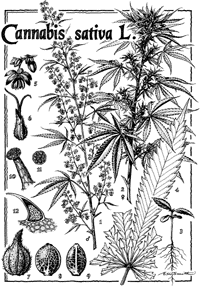Innate cannabis chemical erases fears
Calming brain circuit could treat anxieties
HELEN PEARSON
Brain chemicals similar to those in cannabis wipe out bad memories - and could point to new drugs for severe anxiety.Innate cannabis chemical erases fears
Calming brain circuit could treat anxieties
HELEN PEARSON
The chemicals are called cannabinoids. Mice with faulty cannabinoids can't forget traumatic events, Beat Lutz of the Max Planck Institute of Psychiatry in Munich, Germany and his colleagues have found1. They suggest that the chemicals wipe fearful memories from the brain.
Drugs that boost cannabinoids could help people who suffer post-traumatic stress disorder, phobias and panic attacks, say the researchers.
Its "a great new idea," says neuroscientist Pankaj Sah of the Australian National University in Canberra: "It introduces a whole new target," for such therapies, he says.
Phobics are often treated by gradually exposing them to the object of their fear in a safe environment, to erase the bad association. Lutz suggests that cannabinoid-enhancing drugs, taken at the same time as this exposure, might aid memory clearance.
A joint is unlikely to do the trick: smoking floods the brain with cannabis's active ingredient and produces other effects such as memory changes and pain relief. More effective would be a drug that raised levels of cannabinoids only in the brain's fear centre, the amygdala, says Lutz.
Shock tactics
Lutz's team gave mice mild shocks while playing a loud tone, until the animals froze at the noise alone. When the shocks stopped, mice normally forgot the ordeal and stopped freezing in less than a week. Mice genetically engineered to lack the receptors that bind to cannabinoids were unable to forget within that time.
During memory erasure the amygdala is flooded with cannabinoids; these dampen the action of nerve cells.
Lutz is now giving normal mice cannabinoid boosters to see if they forget learnt fears more quickly. Other brain chemicals are involved in erasing fear. Clinical trials are planned for compounds that activate NMDA receptors in the amygdala, which are also involved in erasing unpleasant memories.
References
